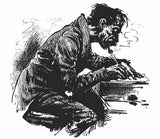An Athens Afternoon
On a January afternoon in Athens many years ago, I explored some of the city’s “must see” sights but saw more than just the Parthenon, Acropolis, and Roman Stadium. I had studied the ancient art and architecture of Athens in a college art history class, but as I’ve often found in my travels, there are unexpected lessons lurking around the corner in every city in the world.
This lesson brought to life something my mother had told me when I was a teenager. She and my father were hard-working Christians, both dedicated to the Protestant Work Ethic and a shared belief in the importance of moral behavior, but their different personalities colored their views. Dad viewed the world in infinite shades of grey, while Mom’s view was forever black and white. She delivered that view loud and clear at every opportunity. [If you think I’m outspoken, you ain’t seen nothin’ yet. When (and if) you get to heaven, look over at God on His throne and you’ll see Mom there, lecturing Him about the global problem of illiteracy].
And me? I’m the kid with the box of 200 crayons, all worn down to stubs from heavy use. I see the world as vividly as my mother but render it in infinite shades of every color on the spectrum. And the people and events that have tested my belief in morality have also enriched my world as they so colorfully illustrate Mom’s black and white rules.
When I was in my teens, Mom warned me to be careful of men who might draw me into immoral situations. Her favorite example was the archetypical man who claimed to be a starving artist and would lure me up to his atelier (attic studio) to show me his etchings, with seduction as his ulterior motive.
That scenario struck me as improbable but quaint. Etching as an art form was popular in centuries past, but not so much in the 1960’s and 70’s, when the psychedelic ruled the art world. Albrecht Dürer’s Four Horsemen of the Apocalypse fascinated me in an art history class, but my own artwork at the time favored pastel flowers and fairies. While etching was an interesting art form, it hardly seemed likely to ever pose a moral dilemma or threat.
Even as a teenager, I knew Mom’s tendency to hyperbole (of which I solemnly swear on a mountain of minutely annotated Bibles that I never, ever in a trillion years inherited even one microscopic iota) well enough to automatically downgrade her wilder warnings. And as an aspiring artist and budding feminist, I envisioned a future in which I might lure a man up to my own atelier, but sadly the opportunity never arose. In fact, I forgot about the starving artist until that day in Athens decades after Mom warned me about him.
As a developer of flooring material (among many other things) for a home renovation and restoration catalog, I went to Greece in search of marble tiles and oriental rugs. My business meetings had to be scheduled around the local custom of a big midday meal, when businesses closed and the city of Athens snoozed for three hours. On this particular day, I found myself at loose ends and decided to go for a walk. No shops were open, but Athens is full of interesting things to see. My hotel was located at Syntagma Square, near the 19th century Old Royal Palace that now houses the Greek Parliament, and within walking distance of many of the “must see” sights.
Huddled in my raincoat, I wandered past Byzantine churches, modern office buildings and shuttered houses. Although the city was sleepy, I was not alone, walking past men who sat on their doorsteps and (I presumed) gossiped the afternoon away. I would smile and nod at them but kept up a brisk pace because it was too chilly and damp to dally. To my surprise, an older gentleman (older than me, anyway) sprang up and walked beside me, saying in excellent English, “Good afternoon, madam. Can I help you?”
“No thank you,” I replied.
“You come up to my place and I show you my paintings?”
I could hardly believe my ears. Here he was: Mom’s starving artist. He would show me paintings rather than etchings, but was the seductive artist all the same. Trying not to smile, I said, “No thank you” and turned away.
Not at all deterred, he followed me for a few feet, saying, “Hey! I know you Anglikí (English) ladies! I know why you come here! You come with me, eh?”
Once again I said, “No thank you,” and because his persistence was making me uneasy, turned the next corner, and the next corner after that, and headed back to my hotel. Were there really paintings in that fellow’s atelier? I’ll never know for sure, but perhaps I missed something wonderful. Or… perhaps not.
I never told my mother about that encounter in Athens that winter afternoon. Why? Because I already knew what her response would be.
“It gives me no pleasure to say this,” she would say, “But... I told you so.”

